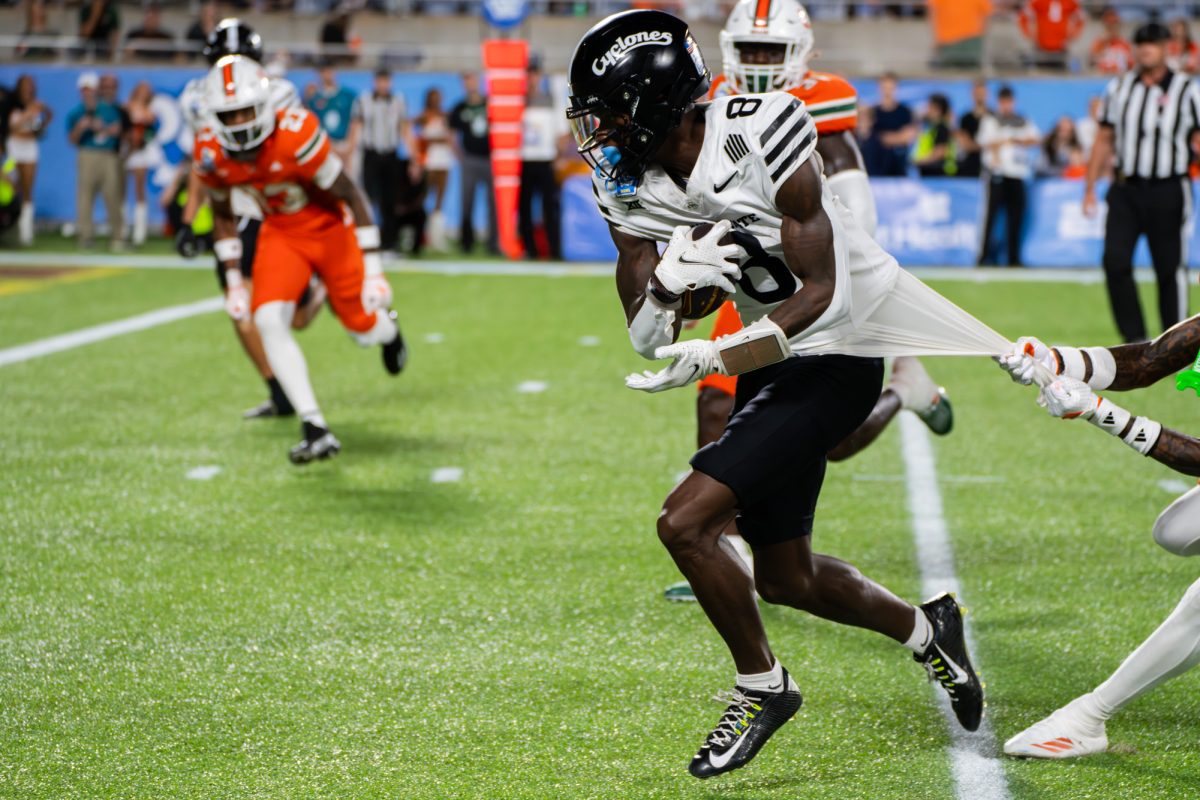Professor works to break LGBT stereotypes, inform students
Photo: Yue Wu/Iowa State Daily
Warren Blumenfeld, associate professor in curriculum and instruction, is going to present recommendations to the department of education to improve campus climate for LGBT people.
March 30, 2011
Warren Blumenfeld has never performed his gender the way he is supposed to.
Or, at least, the way everyone told him he was supposed to growing up in the 1950s, pre-Stonewall Rebellion America.
His parents thought he was gay at age 2, and sent him to a psychologist at age 4 to change his “possible emerging sexual identity.”
The lifelong bullying he has endured because of his sexuality brought Blumenfeld, associate professor of curriculum and instruction, to conduct a two-year research study about the safety status of lesbian, gay, bisexual and transgender students on college campuses and the presence of a safe climate.
Working with LGBT issues for more than 40 years, he surveyed nearly 6,000 LGBT people from universities, junior colleges, students, faculty and staff administrators.
Because it is the most thorough study of its kind in the nation, Blumenfeld was invited to present his research work, “The State of Higher Education for LGBT People,” with other panelists to find ways to improve campus climates for LGBT people across the country April 4 and 5 at the U.S. Department of Education summit in Washington, D.C.
“It’s encouraging to have this kind of forum and I feel privileged to have been invited,” Blumenfeld said.
During college in the late 1960s, Blumenfeld graduated two weeks before the Stonewall riots and the beginning of a movement that started to change the way LGBT people were treated in society.
Except for the excitement of the riots, he didn’t have student services as a gay man during his college career and there was no LGBT student service and no alliance.
“We had this underground group of men and women who didn’t have very many role models,” Blumenfeld said. “In some ways, [it] was a progressive era, but still we were scorned and homophobia was rampant.
“The very fact that we survived and are still alive today I think is quite remarkable. In many ways, we’re real survivors in a very conservative time in American history, and that’s why I love teaching about LGBT history to say where we are coming from so we don’t repeat the mistakes of the past.”
Part of Blumenfeld’s research focused on having the necessary resources available to LGBT people, especially students, on campuses so they feel supported and feel safe on their campuses.
“In our survey … 33 percent lesbian, gay, bisexual and 63 percent transgender [students] seriously considered leaving their campuses because of the negative climate,” he said.
“Fifty-two percent lesbian, gay, bisexual and 63 percent transgender [felt they] had to hide their identity to avoid being intimidated or harassed.”
Blumenfeld said these are extremely high percentages when schools should be a welcoming place for students of all backgrounds and through the research, he is trying to prove that this is simply not the case.
Students who took part in the study also said they not only feel uncomfortable or unsafe on campus, but in the community surrounding the campus.
The summit will have discussions on long-term and short-term strategies. Blumenfeld hopes many of these strategies will encourage campuses to implement the new policies.
Ryan Roemerman, executive director for Iowa Pride Network — a non-profit organization that facilitates LGBT students’ needs — has worked with Blumenfeld for about a year on the Iowa Pride committee.
“He does a very good job about making people understand how everyday, internalized homophobia affects people in a big way,” said Roemerman, who also just conducted a survey about campus climate.
Iowa Pride Network’s survey found three things to be most important when dealing with ways to improve LGBT people’s lives while going to school.
First, colleges and universities need to implement inclusive anti-harassment and anti-discrimination policies; second, faculty, staff and basically everyone needs to intervene or report when they see or hear any form of harassment or discrimination against LGBT people; finally, there needs to be ongoing student support services so that students have the proper resources available.
Although Blumenfeld found that the climate is not ideal for many LGBT people on college campuses, he said Iowa State is very fortunate to have a full-time paid coordinator who assists with LGBT people’s needs on a regular basis.
Brad Freihoefer, coordinator for lesbian, gay, bisexual and transgender student services, has worked personally with Blumenfeld since Freihoefer arrived in November 2008.
“We’re fortunate enough to just walk across campus and set up a meeting with him,” Freihoefer said, who had read Blumenfeld’s work since high school. “His talents are stunning … he’s right here at home, which is a great opportunity for students to take advantage of.”
Freihoefer said it is important to have a full-time staff dedicated to the needs of LGBT people in order to educate others who fall into the categories of homophobia, heterosexism, transphobia and sexism; all of which have a potential threat to campus safety and are just some of the issues negatively impacting LGBT people throughout the country.
Blumenfeld said he can still feel the blood drip from his nose from being beaten growing up because he wasn’t like the other boys, and he struggles with the insecurities and self-loathing brought on by his childhood all the way up through his adult life.
With relatively no friends growing up because he didn’t behave like other boys his age and enjoyed classical music but not sports, people often called him effeminate.
One day in particular, during the time Blumenfeld said he began to develop suicidal behavior from fourth to sixth grade, he had a handful of aspirin in his hand and considered taking the entire amount.
He had heard that if he took the whole bottle, he would bleed from the inside and knew it could be the easy way out.
The only positive role model in his life was his grandfather, a Holocaust survivor whose entire family was wiped out in 1942 Poland. Hitler and Mussolini were both in his grandfather’s town where 2,100 Jews were put into a ghetto.
“If he can survive Hitler,” he said, “I can survive the school bullies. I think my grandfather saved my life.”
Blumenfeld said his research found that family support has a great deal to do, at least initially, with a young person’s sense of identity, self-respect and self-worth.
“If a young person has the full and unqualified support from parents, siblings and other family members, we find that it can be much easier to get a positive self-identity,” he said.
“Not only [supportive role models], the environment that a young person grows up in has [much] to do with whether we internalize our own self-hatred or develop a positive self-identity.”
Blumenfeld is 64 years old, and said he still feels forms of internalized oppression; it’s a daily work to purge those negative messages and replace them with positive images.
“I [still] feel the effects of the abuse, and I’m taking that pain and yes, that victimization, and turning it into positive ways to make sure the generations of today don’t have to go through what we had to go through,” he said. “There’s no place in a civilized society for this kind of treatment.”
Before leaving for Friday for New Jersey to deliver a talk, “The Social Ecology of Bullying,” Blumenfeld played some messages left on his answering machine by complete strangers who often call him after he appears on television or anywhere in the media.
The muffled voices and feedback from the machine played as Blumenfeld calmly listened.
“Sick, sick, that’s all you people are,” a woman said.
“AIDS is a great disease …”
“God made Adam and Eve, not Adam and Steve,” another said.
Several other messages played, demonstrating the stereotypes of LGBT people that many people learn from their schools and their own role models.
Blumenfeld has saved these messages to play at different speeches he delivers throughout the country and especially at schools where Blumenfeld said students hear these sorts of things in K-12 and on college campuses on a daily basis.
“When I play it,” he said, “it hits ’em right in the gut.”







